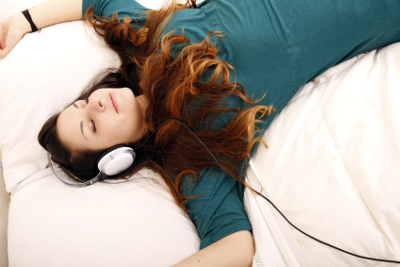 There are many different sleep solutions on the market; some are simple like a fluffier pillow, others are more elaborate like a sleep apnea CPAP mask that assists with breathing. According to a new study by the University of Tubingen in Germany, the best sleep solution may be syncing the sounds around you with the rhythms of your brain.
There are many different sleep solutions on the market; some are simple like a fluffier pillow, others are more elaborate like a sleep apnea CPAP mask that assists with breathing. According to a new study by the University of Tubingen in Germany, the best sleep solution may be syncing the sounds around you with the rhythms of your brain.
There is a certain rhythm to life. From the beating of our hearts, to the songs that get stuck in our heads, to even the rotation of the Earth; rhythm is all around us, which is why we may find ourselves randomly tapping our feet or playing air drums. It turns out our brains also have a rhythm all its own. When we sleep, our brain's rhythm slows down and oscillates; this rhythm can be identified by the brain's electrical patterns.
In a sleep lab, 11 sleepers were subjected to a rhythmic sound generated to match their electrical brain readings. This simple solution strengthened the sleeper's brain oscillations, providing them with a deeper sleep and even improving their memories.
To test this brain rhythm sleep theory, additional test subjects slept with sound rhythms played back that was out of sync with their brain's rhythm. Compared to the in-sync sleepers, these out of sync subjects had a more difficult time remembering word associations from the night before. Moral of the story, if you are cramming for an exam, sound rhythms may be more useful than cheat sheets--and more ethical.
The best thing about using sleep rhythms is that it's a natural remedy. There's no health risks because no medication or electrical stimulation is involved. Using sound to match brain rhythms is currently being looked into as a solution for insomnia, and by matching the brain rhythms that are needed for attentiveness, sound rhythms may also be useful to help keep people alert while they are awake.
The sleep rhythm technology is still in development and may not be as easy as just falling asleep to a Marvin Gaye album. Project leader Jan Born of the University of Tubingen explains, "The method cannot be applied by everyday people, at the moment, because the essential point is the 'closed-loop' fashion of our stimulation, using the brain's own rhythm as a pacemaker, where electroencephalogram (EEG) readings predicted just when to deliver the next noise to sleepers to improve their sleep." Born goes on to explain that inventing a device that records someone's EEG (brain rhythm), and then matching the readings with an online audio database is in the foreseeable future.
What do you think? Does sleeping to the rhythm of your brain sound like it will work? Have you found it easier to fall asleep with certain noises going on in the background? Share with us your thoughts in the comments, then go take a nap :)
![]()

